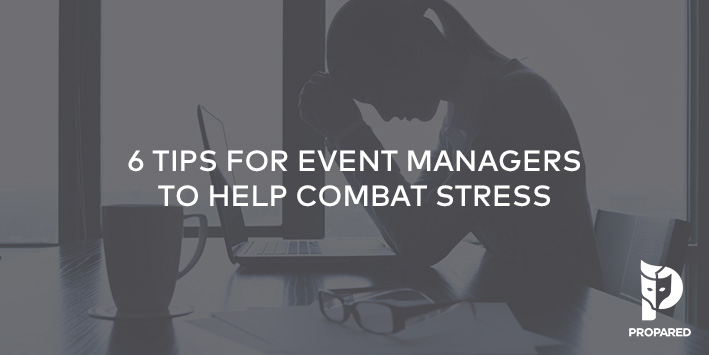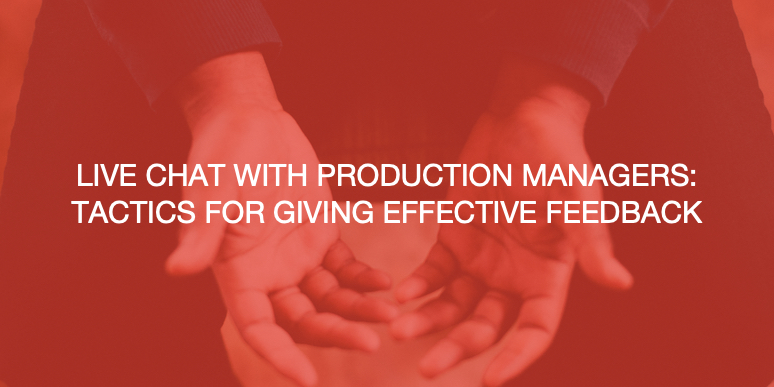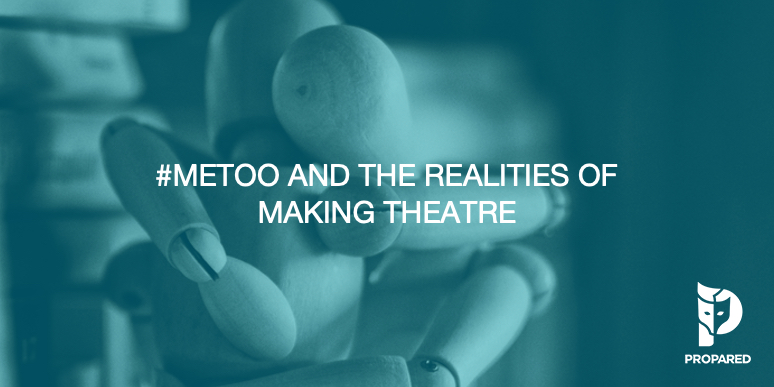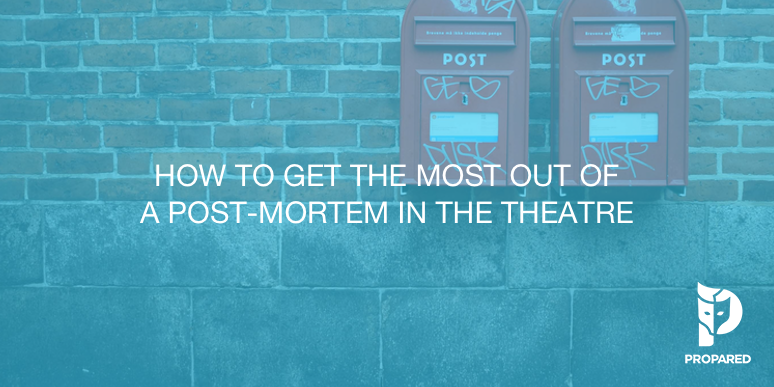
I recently had a “flip the table” moment. Figuratively, I mean. Do you ever get those? You’re at your desk, looking at a mountain of stuff and suddenly, all the stress, anxiety, and emotion just bubbles over and you want to just let it out.

As satisfying as flipping out might be in the moment, it doesn’t actually solve the underlying problem: your stress is getting in the way of being productive and creative. You might let it out for a moment but it will inevitably come back, perhaps greater than before.
No one knows this better than event managers. In fact, there are few jobs as intense. Don’t take my word for it. Year after year, it is named as one of the most stressful jobs. Event planners and production managers have hundreds if not thousands of details to track. And often, very little help in doing it. That kind of pressure builds up. Before you know it, you’re developing a twitch. OK, maybe not that extreme. But your fuse is probably pretty short. And that can be a problem if you’re leading an event team.
So how do you take back control of your work, lower your stress level, and increase productivity? Here are some tips to get you headed in the right direction.
1. Recognize the Sources of Your Stress
Event planners get busy. Really busy. In some ways, this makes you work harder. I know quite a few who would say the having “too much to do” is motivating. It gets their adrenaline pumping and off they go. But with that temporary rush comes a myriad of other concerns, some of which might be detrimental to long term health and success.
Research shows that stress causes a myriad of physical changes to the body, only ONE of which is a surge in adrenaline and cortisol levels. It may help if you’ve got to get a few set pieces into a venue and staged in a hurry. But stuck in traffic on the way to a client meeting? Not so much.
In fact, every individual responds to these physical shifts in different ways. Melissa Eisler from the Chopra Center recommends you take the time to understand how you personally react to stressful situations. Take this short quiz to help identify your mind-body constitution and tendencies so you can recognize the factors that lead to greater stress.
2. Delegate Responsibility
Event planners can be control freaks. And why not? Ultimately, you’re the one who owns an event’s execution. If things go South, you’re going to be the one taking the hit. Knowing this, it can feel at times like you need to have your hands in everything. Otherwise, you’ll miss a detail that derails the vision.
Time to let go of this way of thinking. Even if you had the hours to tackle everything (which, by the way, you don’t), you be too mired in the weeds to see the bigger picture. And that is a perspective that only you can offer.
Leadership coach and author Erika Anderson recommends that you ask yourself two questions. “Am I the only person who can do this?” and, “Should I be the only person who can do this?” If your answer is “No” to either, don’t do it. Provided you hired the right people, trust someone else to handle it and pass it off.
3. Get Moving In a Different Space
Exercise is a great way to relieve stress. Get outside and walk, hit the gym, or just get up from your desk and move around a bit. But hold on. Event planners are already on the move. Outside, inside, on their feet. Most of you are probably hitting your 10,000 steps by lunch. You’re exercising, but it might not be helping your stress, so what can you do?
Exercise away from work. Research by Harvard psychologist Ellen Langer shows that bringing a self-awareness to one’s exercise can dramatically improve results. In other words, head space matters. Instead of just walking the perimeter of the trade show floor, get outside and away from the venue. You’ll be much more likely to reset if you can change your environment and forget about work for a few moments.
4. Get Organized
A messy desk, or desktop drives me crazy. Dr. Sherrie Bourg Carter explains that clutter “bombards our minds.” It creates excessive stimuli, splintering our focus from what is most important. It sends signals to our brains that, “Work is never done.”
To combat this, create “homes” for your work that define boundaries and order. Prioritize what you need for your current projects and file away the rest. Professional organizer Fay Wolf call this, “active paper vs. inactive paper.” Active paper is anything you need access to on a regular basis, like a current event schedule, or bills, or a daily to do list. Inactive paper is your reference materials, such as past contracts or site plots. Event planners need space to cultivate their creativity. It starts with an organized work area.

5. Create Buffers in Your Day
Yesterday, I had three meetings back-to-back-to-back; 8-9, 9-9:45, and 9:45-10:30. Before I even had time to plan out my tasks, I already felt behind. Event planners go through everyday. You meet with a client, then your team, then a vendor. Then you’re off to do a site survey and connect with the venue manager. A quick lunch on-the-go and then another round of meetings. You’ll get it done but the stress will take its toll.
Build buffers between your meetings whenever possible. Even 10 minutes before jumping from one to another can give you time to reset and calm your mind. Depending on your schedule, you may find it helpful to book meetings with yourself! Set a private meeting and inform your team the same way you would with any other appointment. Then sit in your own space and work on tasks that are just for you. Your personal to-do list. It’ll feel great and give you renewed energy when you emerge for your next meeting.
6. Know When to Turn off the Light
We all like the feeling of completing something, right? I know I do. I like it so much it can actually stress me out more. I sometimes imagine reaching a point where I’ve done everything I had to do in a day. I leave the office with a completely empty plate, ready to start the next day anew. But it never happens because something unplanned always comes up. Even f I’ve been my most efficient and productive self, there will always be work left unfinished at the end of the day. There is simply too much to do.
This is ok. Picking a cut-off time to your day and sticking to it helps you separate from the stresses of work and recharge. Get out and see friends, go to dinner, laser tag, whatever. Finding balance between your work life and personal life helps cement your accomplishments. Rather than obsessing over what didn’t get done, you can reflect positively on what did.
Stress will always be a part of our lives. In fact, in moderation, it can be a positive force. But too much and the well-documented effects can be disastrous. With so much to do, event planners and production managers can get overwhelmed and trigger these harmful effects. Rely on your colleagues, find ways to keep a clear mind, exercise, get organized, and know when to clock out. By actively taking these steps, you’ll find more energy and creativity with which to grow your business.
Event managers: how do you combat stress at work? Share your hacks with us in the comments below.



